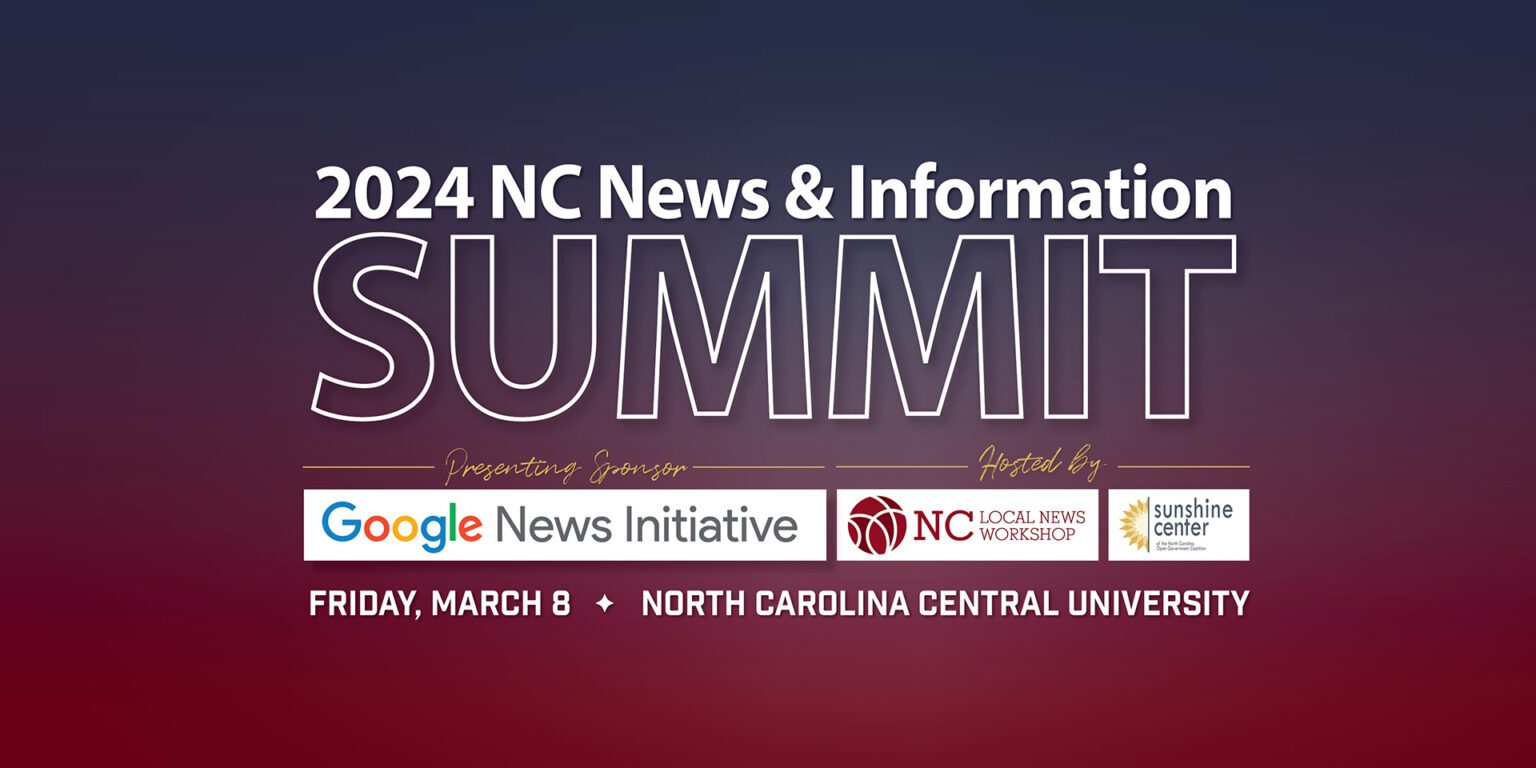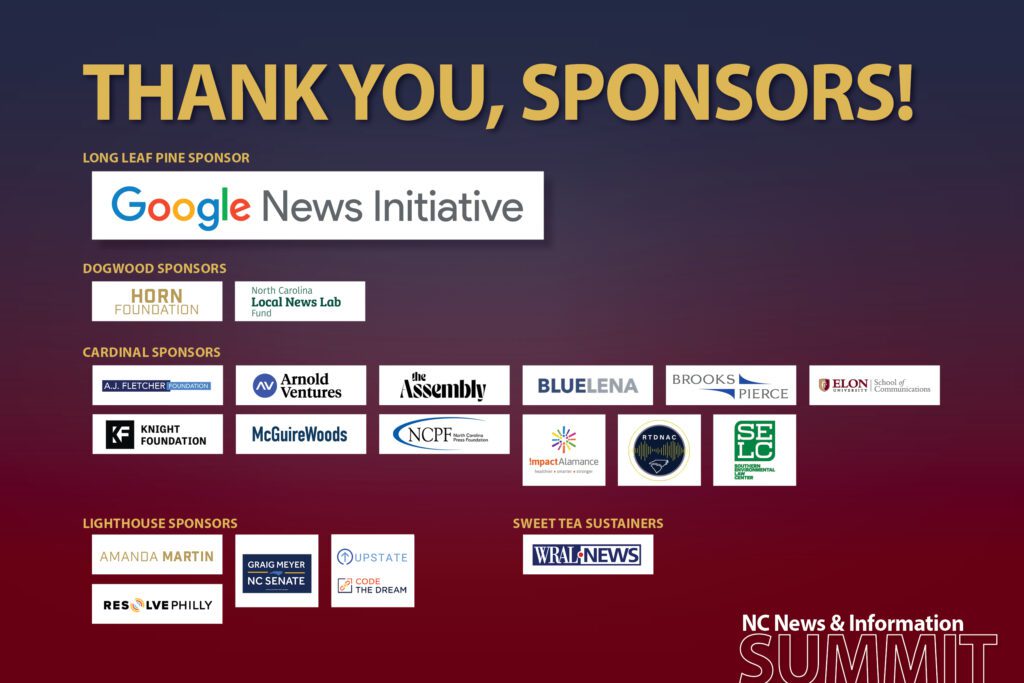
Summit heads to NC Central’s campus March 8
For a third consecutive year, news and information professionals dedicated to sustaining local news and open government in the Tar Heel state will gather at the North Carolina Local News & Information Summit. And for the first time, the summit will take place at North Carolina Central University on Friday, March 8.

Presented by the NC Local News Workshop and the NC Open Government Coalition, with presenting sponsor Google New Initiative, the daylong summit will be held at NC Central’s Alfonso Elder Student Union. It kicks off with a welcome, followed by the presentation of the NC Open Government Coalition’s annual Sunshine Awards. After that, attendees will enjoy a keynote fireside chat between Sailor Jones of Common Cause North Carolina and Cierra Hinton of Blue Engine and Scalawag Magazine, with PBS NC’s Deborah Holt Noel moderating the conversation.
While the summit is sold out, a waitlist is available.
During their fireside chat, “Building a Fourth Branch: The Power of Information, Community and Trust in 2024,” Jones and Hinton will draw on their experiences as connectors and activators in news and public advocacy, sharing their visions for rebuilding trust across North Carolina.
Schedule
WELCOME & KEYNOTE PRESENTATION – 9-10:30 AM
Building a Fourth Branch: The Power of Information, Community and Trust in 2024
Event Hall, Room 2319
Late last year, the North Carolina General Assembly exempted itself from state public records laws and eliminated access to congressional redistricting records, depriving the public of key tools for holding lawmakers accountable. If we do not act, the public will be left in the dark.
How can the fourth branch effectively check the powerful and provide communities with information they need for true self-governance? Who do we work with to revive the press as a core societal institution? Where can we use our power and influence to do the most good?
The 2024 North Carolina News & Information Summit keynote between Sailor Jones (Common Cause North Carolina) and Cierra Hinton (Blue Engine Collaborative and Scalawag Magazine), moderated by Deborah Holt Noel (UNC-TV), will tackle these questions. In their fireside chat, “Building a Fourth Branch: The Power of Information, Community and Trust in 2024,” Jones and Hinton will draw on their experiences as connectors and activators in news and public advocacy, and share their visions for rebuilding trust across North Carolina. They will explain why we should be hopeful about efforts to sustain the free flow of information and a robust free press in the years to come.
FIRST SESSION BLOCK – 10:45-11:45 AM
Legal rights and resources for journalists covering the 2024 election
Senate Chamber, Room 2002
Understanding reporters’ legal rights and the free legal resources available to support election coverage is essential for journalists covering the 2024 races. This session will discuss journalists’ newsgathering rights during elections; issues with reporting at conventions, polling places or demonstrations; how to navigate speech restrictions placed on public employees; and a range of free resources available from the Reporters Committee for Freedom of the Press and its local partners.
Facilitators: Christina Piaia (Reporters Committee for Freedom of the Press/ProJourn), Amelia Kennedy (RCFP), Beth Soja (RCFP), and Israel Balderas (Elon University)
How public policy could fund local news
Room 2202
Some important public policy proposals to support North Carolina newsrooms are gaining momentum around the country. Participants will discuss some of these proposals, including the federal Community News and Small Business Support Act, fellowship programs, advertising grants, tax credits and digital equity investments, and will brainstorm toward action.
Facilitators: Anna Brugmann and Antionette Kerr (Rebuild Local News)
Inside great North Carolina newsletters – and how to build your own
Room 2201
Sarah Day Owen Wiskirchen and the expert coaches at Blue Engine Collaborative will break down the strategies and tactics of newsletter entrepreneurs in North Carolina. You’ll leave this session with the knowledge and inspiration to build an awesome email product for your news organization, nonprofit or company, including a step-by-step guide.
Facilitators: David Grant (Blue Engine Collaborative) and Sarah Day Owen Wiskirchen (Minerva Media Co.)
Creating your individual mission statement
Room 2211
We all want to feel like our work matters and track its impact. But when things get busy, and the to-do list grows ever longer, it can be hard to step back and assess progress and measure success. Creating an ambitious, focused and clear mission statement can help. This interactive session will use group and pair work to help attendees craft an individual mission statement.
Facilitator: Colleen Murphy (Open Campus)
Enhancing media literacy through food coverage
Room 2127
Learn how more rigorous and nuanced food reporting can build audience trust and engagement. Hear from journalists of the Food Section and INDY Week on applying journalistic standards and reporting methods, followed by a collaborative brainstorm to enhance your organization’s food coverage.
Facilitators: Hanna Raskin (The Food Section) and Lena Geller (INDY Week)
LUNCHTIME OFFERINGS – 11:45 AM-1 PM
Lunch is open, but guests are welcome to attend the following affinity group meetups:
- Newsletter Bootcamp Kickoff (Participants only, Room 2128)
- Women in Journalism Meetup (Room 2202)
- NC Local News Lab Fund Philanthropy Roundtable Drop-In (Room 2201)
- News Syndication Roundtable with Beacon Media (Common Space)
SECOND SESSION BLOCK – 1-2 PM
Inaccessible and unaccountable: Lessons in legislative privilege and advocacy
Senate Chamber, Room 2002
The North Carolina legislature recently eliminated public access to their records. Join American Oversight and Common Cause North Carolina to discuss how organizations, media and individuals can continue to leverage public records requests to defend democracy. This session’s moderated discussion and brainstorm will highlight examples in North Carolina and other states that can inform advocacy.
Facilitators: Alissa Lopez and Elizabeth Haddix (American Oversight), and Ann Webb (Common Cause North Carolina)
Election tools for newsrooms
Room 2202
This session will cover tools for tackling misinformation, tips for doing advanced searches across the web and social media, and how to transcribe audio and analyze datasets using Google’s AI-powered tool, Pinpoint.
Facilitator: Colleen Kimmett (Google)
Thinking beyond the deadline: What do small newsrooms need to embrace a product mindset?
Room 2201
What is “product thinking” and why is this mindset so important for local newsrooms? We’ll talk about why news product has taken off as a core focus and strategy for newsrooms across the world and discuss what’s needed to help independent publishers and small newsrooms embrace product strategy without over relying on vendors. Participants will walk away with strategies to adapt product thinking, management skills and frameworks into any size newsroom or project.
Facilitators: Shannan Bowen (NC Local News Workshop) and Tony Elkins (Poynter)
It’s your right: Navigating agency reluctance and unreasonable special service charges workshop Room 2211
Accessing public information is critical to well-backed storytelling, but journalists are often deterred from pursuing public records due to costly special service charges. The Duke First Amendment Clinic will lead an interactive session to help attendees fight back against unreasonable special service charges. Additionally, attendees will have the opportunity to provide feedback on a model policy to better meet journalists’ needs and will walk away with a toolkit to put the session’s lessons into practice.
Facilitators: Kyle Compton, Briana Megid and Kristian Wright (Duke First Amendment Clinic)
Building trust through environmental reporting
Room 2127
Environmental and climate journalism is growing. To make a lasting impact, coverage must build and sustain credibility by ensuring accuracy, fairness and responsible storytelling. Learn reporting and research essentials to build and maintain audience trust while battling misinformation and disinformation.
Facilitator: Melba Newsome (independent journalist)
THIRD SESSION BLOCK – 2:30-3:30 PM
Get involved in the plan for a statewide news hub
Senate Chamber, Room 2002
We’ve been working on a plan to create a statewide news hub to localize state government information and statewide issues by working with news and information partners across our ecosystem. We’ll outline the plan, update you on where we are, and then turn to you for your input and ideas. We’ll explore the concept of a Documenters program for North Carolina and facilitate a conversation about how we could use this program – and where.
Facilitators: Shannan Bowen and Melanie Sill (NC Local News Workshop)
Finding the leader within: Creating the change you want to see, no matter your role
Room 2202
This interactive session is designed to build better news and information leaders. Identify your leadership style, potential barriers and collaborative solutions to find your path forward. Leave with resources for influencing change, including a community of other leaders to help you along.
Facilitators: Bill Church (The News & Observer), Tony Elkins (Poynter), Maydha Devarajan (CityView Today), and Sarah Day Owen Wiskirchen (Minerva Media Co.)
Inside a creative collaboration: How the CJC partners with artists to tell stories
Room 2201
The Charlotte Journalism Collaborative (CJC) has been a model of how collaborative journalism can serve communities since its 2019 launch. During COVID-19, CJC developed a creative, artist-led project to get relevant, reliable information to people who might not be reading or tuning into traditional news sources. Join Chris Rudisill (CJC) and Marcus Kiser, lead artist of “PANDEM!C: Stories of COVID-19,” for an interactive conversation about how creative collaborations can bring more people into the local news process and engage new audiences around important information.
Facilitators: Chris Rudisill and Marcus Kiser (Charlotte Journalism Collaborative)
Ensuring a diverse journalism workforce through early outreach
Room 2211
Hear directly from diverse young journalists from the Triangle, their career paths, and what inspired them to pursue journalism as a career. In a facilitated conversation, we’ll brainstorm ways to support and grow diverse journalists in the NC local news ecosystem as early as high school.
Facilitators: Laura Brache (The News & Observer), Bryan Christopher (Durham Public Schools), Donna Diaz (Riverside High School), and Mair Famet (UNC-Chapel Hill)
FOURTH SESSION BLOCK – 3:45-4:45 PM
Uncovering NCGA: Tools and approaches to getting information from state legislators
Senate Chamber, Room 2002
Hear how local journalism and civic tech organizations are holding state legislators accountable through coding tools and investigative approaches. Through a brief demonstration, a panel discussion and a participatory brainstorm, attendees will understand efforts that work.
Facilitators: Ricky Leung (Code the Dream), Cody Hill (Upstate), Brooks Fuller (North Carolina Open Government Coalition), and Jordan Schrader, Dawn Baumgartner Vaughan and Avi Bajpai (The News & Observer)
Seeing community workshop: Visual approaches for building audience engagement
Room 2202
Visual journalism can be a tool for engagement, community building and more impactful, contextualized storytelling that is both responsible and equitable to the photojournalists themselves and to the communities they cover. Come share resources, tips and case studies for integrating a more visual approach into your reporting and engagement strategy.
Facilitators: Jenny Jacklin-Stratton (CatchLight) and Andrea Bruce (Down in the County)
Best practices in building and sustaining reader engagement
Room 2201
Successful community news organizations recognize the importance of developing highly personalized reader journeys designed to engage readers and build trust. In this session, we will share best practice approaches to managing the audience funnel – from acquisition to engagement, conversion, retention and advocacy.
Facilitators: Daniel Williams and Kai Crutchfield (BlueLena)
SWOT team: Addressing the biggest problems and opportunities in political reporting
Room 2211
A panel of North Carolina political reporters and the audience examine strengths, weaknesses, opportunities and threats (SWOT) they face either from internal or external forces when covering state politics. The session will give attendees an honest assessment of what it’s like to cover North Carolina politics right now and a vision for what could be done to make our news ecosystem better. Come ready with questions and ideas.
Facilitators: Bryan Anderson (Anderson Alerts), Kate Sheppard (The Assembly), Colin Campbell (WUNC), and Tim Boyum (Spectrum News)
RECEPTION – 5:30-7 PM
Join the After Party!
Don’t miss our reception at Ponysaurus Brewing located at 219 Hood Street in Durham. Thanks to The Assembly for hosting!
Parking Pass Available Here
Before you head out to attend the March 8 Summit, be sure to download and print the printing pass.
Sponsorships


